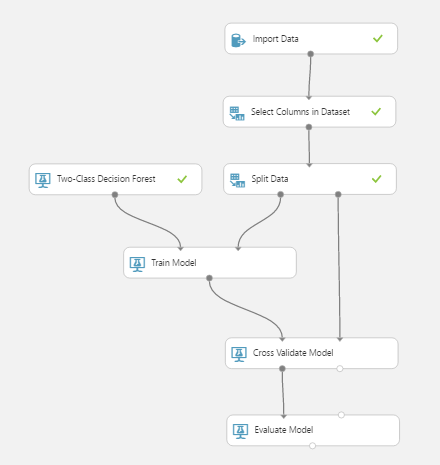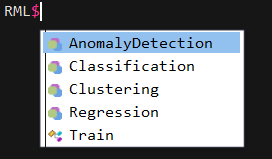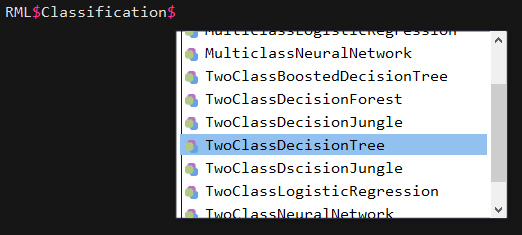R Machine Learning Framework - A simpler way to do machine learning in R.
Inspired by Microsoft's Azure Machine Learning, this is an attempt to provide a simple, clean workflow for rapid prototyping in R.
These steps are replicated in RML as follows:
- Import Data and Select Columns -
dataSet <- iris - Split Data -
dataSet <- RML$SampleAndSplit$SplitData(dataSet, 0.7) - Select Model -
model <- RML$Classification$TwoClassDescisionTree() - Train Model -
trainModel <- RML$Train$TrainModel(model, dataSet$Train, dataSet$Species) - Cross Validate Model -
Coming Soon - Evaluate Model -
summary(trainModel)automated evaluation to come.
Training models in R can be a messy business. Simple tasks like importing a dataset, splitting it into training and test sets and passing it to a model can result in many extra and often cryptic lines of code. When comparing models it's often easy to forget the different packages we used, what their syntax looked like and what stucture your data should be in.
RML seeks to cut through some of this noise by providing a well defined workflow, common utility methods and grouped models with clean, uniform APIs.
The result should be a rapid prototyping environment that will increase team colaboration, encourage cleaner more reusable code and ultimately free up our time to solve more problems.
The RML Names Space will be grouped by functionality so as to guide you through the process of building and tuning models as much as possible.
Base Name Space
Model selection
Tuning model parameters
Current workflow (got a long way to go)
A simple linear regression using lm. This is supported primarily to match Microsoft Azure ML's functionality.
source("./RML/rml.R", chdir = TRUE)
dataSet <- iris
model <- RML$Regression$LinearRegression()
trainModel <- RML$Train$TrainModel(model, dataSet, dataSet$Sepal.Length)
Here it is best to use the lm syntax directly.
Using the rpart package.
Assumes a set of default parameters.
- method = auto
- min split = 30
- min bucket = 0
- cp = 0.001
source("./RML/rml.R", chdir = TRUE)
dataSet <- iris
model <- RML$Classification$TwoClassDescisionTree()
trainModel <- RML$Train$TrainModel(model, dataSet, dataSet$Species)
Custom parameters can be set and tuned explicitly.
source("./RML/rml.R", chdir = TRUE)
dataSet <- iris
dataSet <- RML$SampleAndSplit$SplitData(dataSet, 0.7)
model <- RML$Classification$TwoClassDescisionTree(method='anova', minSplit='10', minBucket='5', cp=0.02)
trainModel <- RML$Train$TrainModel(model, dataSet$Train, dataSet$Train$Species)
Using the kmeans package.
Assumes a set of default parameters.
- nstart = 20
- iterations = 100
source("./RML/rml.R", chdir = TRUE)
dataSet <- iris[, 1:4]
model <- RML$Classification$KMeans(centroids = 3)
trainModel <- RML$Train$TrainModel(model, dataSet)
Custom parameters can be set and tuned explicitly.
source("./RML/rml.R", chdir = TRUE)
dataSet <- iris[, 1:4]
dataSet <- RML$SampleAndSplit$SplitData(dataSet, 0.7)
model <- RML$Classification$KMeans(centroids = 3, numberOfStarts = 50, iterations = 200)
trainModel <- RML$Train$TrainModel(model, dataSet$Train)
- Method for comparing like models
- Data importing CSV, SQL, REST etc.
- Data and model caching, only retrain if the input has changed.
- Auto tuning of Hyperparameters
- Anomaly Detection
- One-Class Support Vector Machine
- PCA-Based Anomaly Detection
- Classification
- Multiclass
- Decision Forest
- Decision Jungle
- Logistic Regression
- Neural Network
- Two-Class
- Boosted Decision Tree
- Decision Forest
- Decision Jungle
- Logistic Regression
- Neural Network
- Support Vector Machine
- Multiclass
- Regression
- Bayesian Linear Regression
- Boosted Decision Tree Regression
- Decision Forest Regression
- Fast Forst Quantile Regression
- Neural Network Regression
- Ordinal Regression
- Poisson Regression



